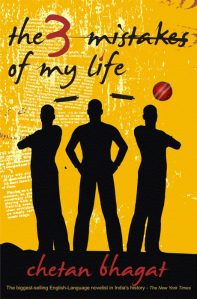The 3 Mistakes of My Life Review: One of the Lightest Book of Fiction
Title: The 3 Mistakes of My Life
Author: Chetan Bhagat.
Chetan Bhagat again feels compelled to provide a framing device for The Three Mistakes of My Life: The mistakes are not his but rather those of Govind Patel. A Prologue describes how Bhagat came to the story, with a suicidal Govind having sent him an e-mail and Bhagat rushing to Ahmedabad (from Singapore !) to hear the young man's story. Govind warns that his story: "is not trendy like the IITs and call centers", but Bhagat sits by his hospital bedside and wants to hear the whole thing.
Govind's account begins in 2000. He's a very good maths student, living in the sleepy metropolis of Ahmedabad, Gujarat, but has limited opportunities to study at a decent college; in any case, he wants to go into business and help support his mother. Govind has two close friends, Ishaan (called Ish), who is a very talented cricket player, and Omi, whose father is the priest at the local Swamibhakti temple.
They're cricket-obsessed youngsters, and neither Ish nor Omi have much of an idea what to do with their lives -- but Govind does. He wants to open a cricket shop, right in the Swami temple complex -- an ideal location both because of the cheap rent and the enormous amount of traffic, especially of bored kids -- and his two friends are just the partners he could use.
So the three friends go into business together, and it works out fairly well. It's a business success and seems to offer a promising future. And they even discover a local youngster named Ali who is an incredibly promising cricket-talent and take him under their wings. Of course, Ali is a Muslim .....
Govind also tutors students in maths and is eventually coaxed into tutoring Ish's seventeen-year-old sister, to help her prepare for the medical school entrance exams. Naturally, something more develops between them -- but, as Omi, the first to figure that out, tells him:
'There is an unspoken rule among Indian men, and you broke it.'
What rule?' I said and slammed the menu on the table.
You don't hit upon your best friend's sister. You just don't. It is against the protocol.'
It's more than just against the protocol -- and Govind does more than just hit on the sister. Eventually, of course, Ish finds out and sees it as the ultimate betrayal.
It's not business as usual with the business, either. Govind has grand ambitions, but there are some forces that can overwhelm even the best-laid plans. The triple-whammy that hits the three friends is a devastating earthquake, the 2001 attacks on New York and Washington D.C., and then, hitting particularly close to home, the attack on a train near the Godhra station in Gujarat. The latter led to widespread Hindu retaliation against Muslims, and it is this frenzied violence that Govind's story culminates with, as the three friends and their protégé, Ali, find themselves in the thick of things.
Among the side-adventures in the novel is a trip to Australia (for cricket purposes, of course), and their host asks them what the national obsessions in India are:
'There's a lot of people. And there's a lot of obsessions. That's the problem,' Ish said.
'But religion and politics are pretty big. And them together, even bigger,' I added.
Religion and politics and the tension they create figure prominently in the story. Omi's family is politically involved, and militantly Hindu-nationalist; among their pet causes is the row over the temple at Ayodhya. Meanwhile, Ali's father is a sensible secular Muslim -- and neither the secular nor the Muslim identity find much favor among the militant Hindus.
It all comes to a very predictable conclusion, as Bhagat has telegraphed the looming confrontations from the beginning on. There's some decent drama to it, but also too much that is too far-fetched.
The Three Mistakes of my Life is, for the most part, young-lad-lit, a YA novel content with limited ambitions, trying to convey some sincere messages but entirely lacking in subtlety or finesse. Bhagat offers a good deal to young readers -- sport, nationalism, romance (but not too mushy) and some sex, more sport, an excursion to exotic Australia (and some examples of their lingo -- and a topless beach).
It seems fairly well-meaning, but it's also almost entirely artless. Bhagat does a few things quite well -- there are convincing moments and voices -- but he also tries way too hard, and the construct constantly creaks (never mind the ridiculous framing device, which he returns to in his epilogues (yes, there's more than one)). It's all too obvious how he puts his pieces into place, and he doesn't write nearly well enough for that to be a forgivable fault.
This is pop-fiction of the lightest, laziest sort, and its tackling of serious real-life issues and incidents gives it a veneer of earnest thoughtfulness that stands up to nothing.




Comments
Post a Comment